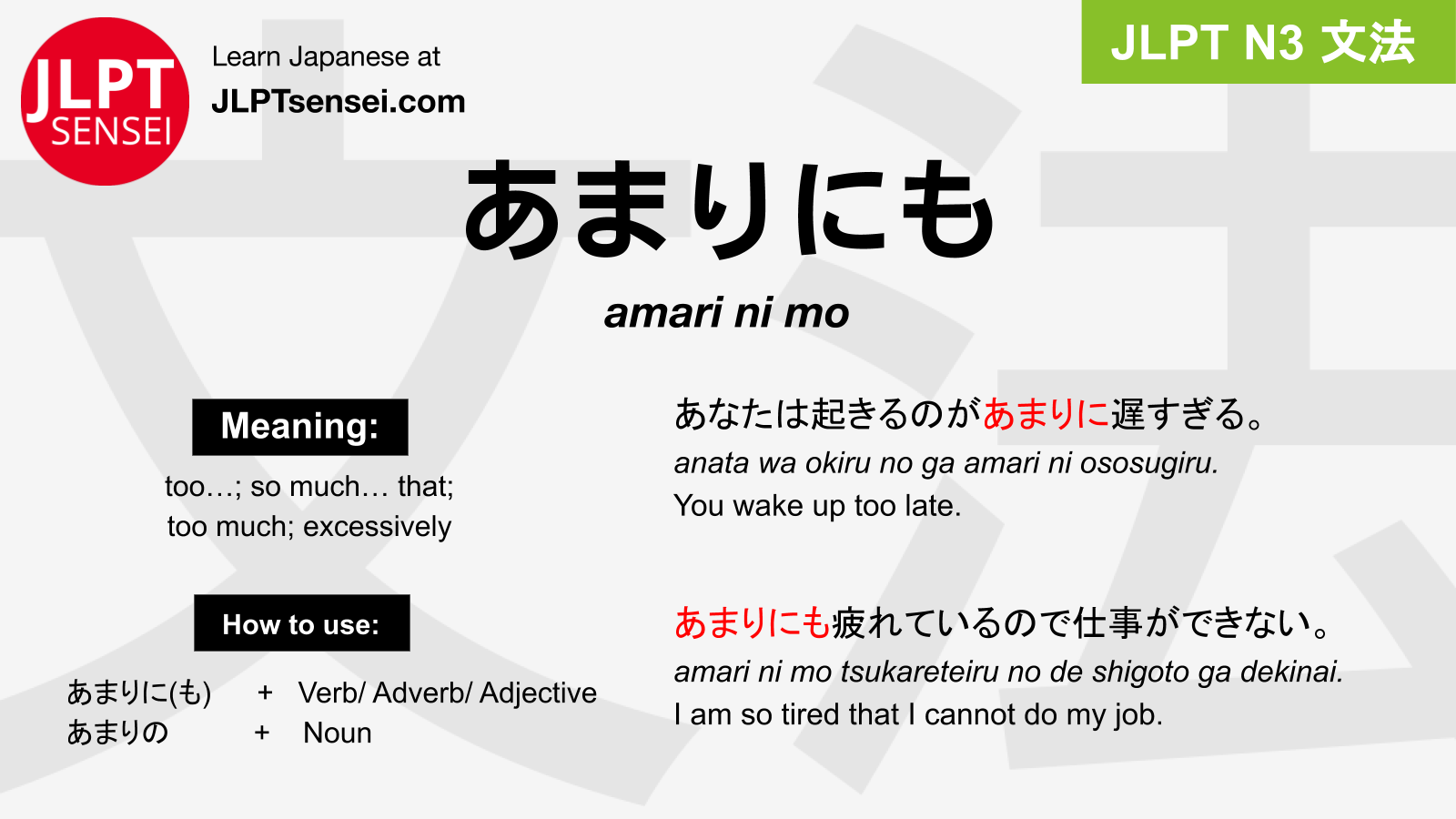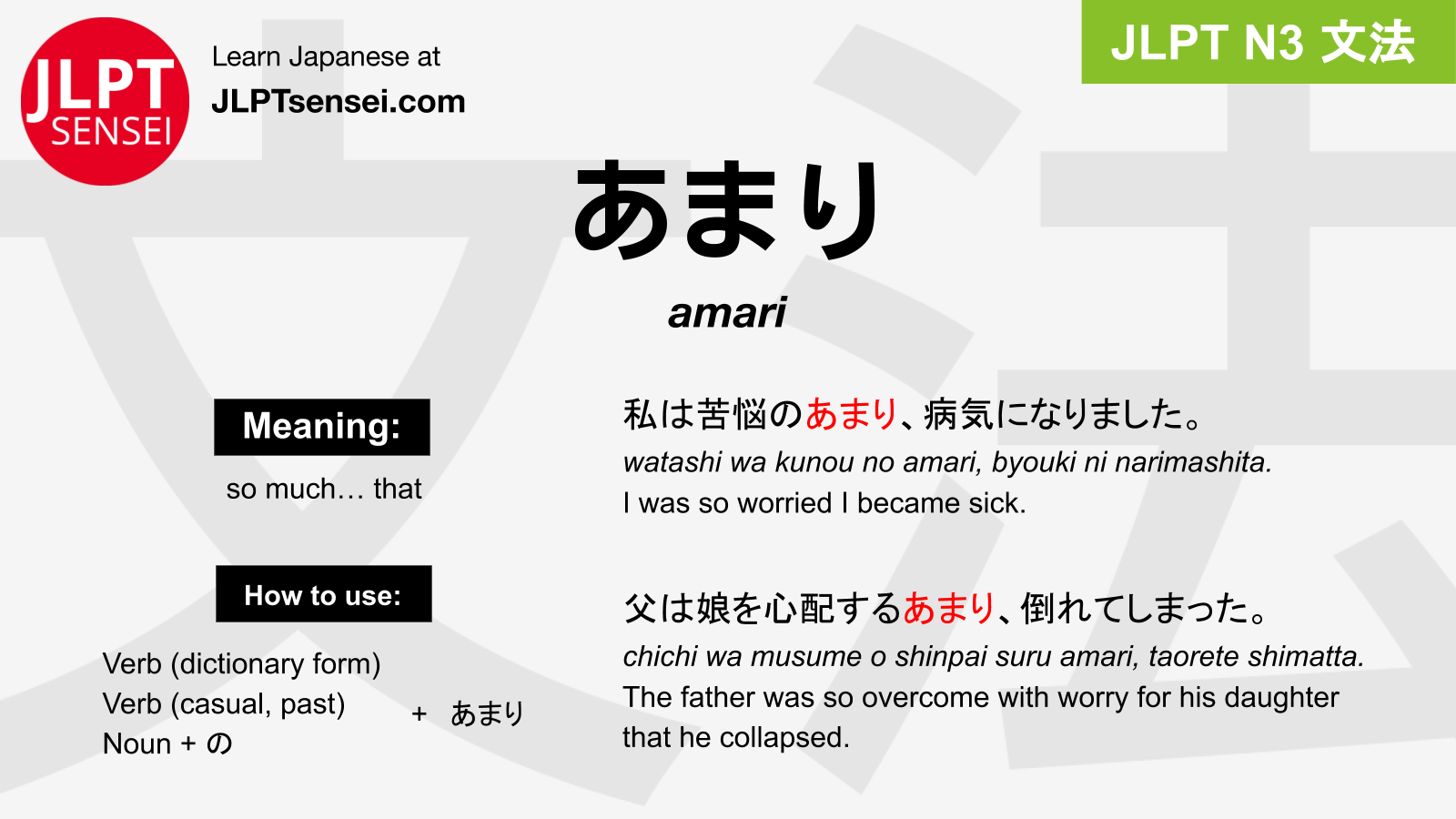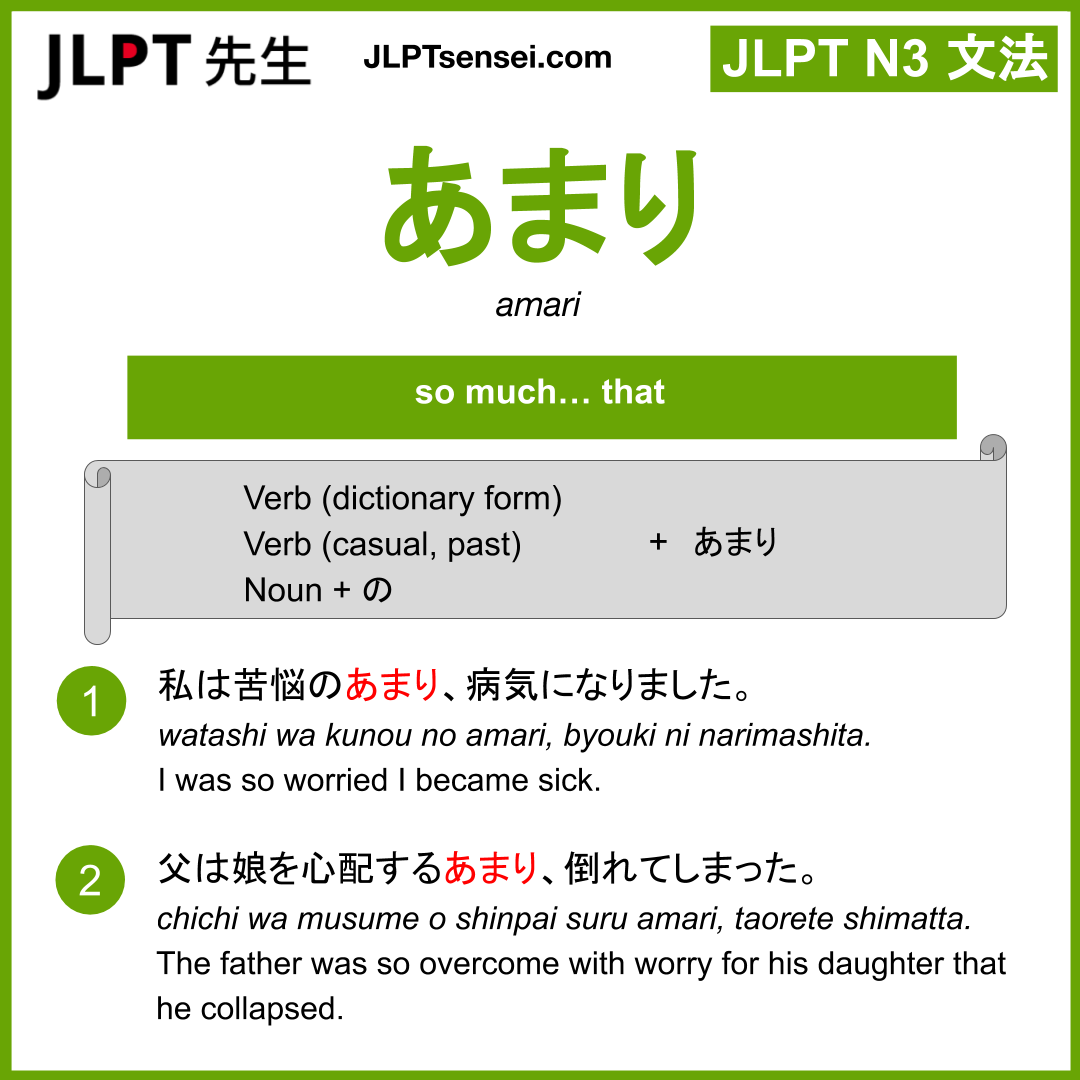
Amari In Japanese Japan 24 Hours
related grammar Level: JLPT N4 Tags: ~ない, Japanese adverbs, negative expressions How to use 使い方 Learn Japanese grammar: あまり~ない (amari~nai). Meaning: not very, not much ~. This is used in combination with the negative form of an adjective or verb to describe something that you don't really do.

amari あまり Japanese For Beginners
Japanese Dictionary Meaning of 余り あまり in Japanese 余り, 餘り JLPT 5 あまり, あんまり amari, anmari adjectival nouns or quasi-adjectives (keiyodoshi), adverb (fukushi), nouns which may take the genitive case particle `no', noun (common) (futsuumeishi), noun, used as a suffix remainder; rest; balance; remains; scraps; residue; remnant 1か月 あまり 名古屋 に居た ことがある 。

amari ni mo あまりにも jlpt n3 grammar meaning 文法 例文 japanese flashcards
Verb (casual, past) Noun + の. Learn Japanese grammar: あまり (amari). Meaning: so much… that. If you want to use this with an adjective, use あまりにも (amari ni mo) instead. Click the image to download the flashcard. Download all N3 grammar flashcards. Download our complete.

Amari Meaning Japanese Japan 24 Hours
The Japanese word "あまり" means "not.very". Therefore, "あまり好きじゃない" is translated as "I don't like it very much." 20 musicsoccer • 2 mo. ago Just like how the word "run" has different meanings, あまり does too. In あまり好きじゃない it's acting as an adverb, as it's modifying the verb 好き.

Gramática JLPT N3 あまり (amari) Significado
What does 余り (Amari) mean in Japanese? English Translation. remainder. More meanings for 余り (Amari) remainder noun. 後, 残高, 余り物, 贏余, 贏. too much adverb.

あまり (amari) Meaning Japanese Grammar So Much That
I am following a book called "Teach Yourself Japanese", right now I am on using adjectives. In there, there is an example: Igirisu no jamu wa totemo oishii desu. Which I can understand in terms of structure and rules etc.. But in the book, it says that when an adjective is in the negative, "Amari" must be used. So:

amari あまり jlpt n3 grammar meaning 文法 例文 learn japanese flashcards
The meaning of "amari" in Japanese is "not much" or "not very". It's often used to express a negative sentiment or to indicate that something is not to a certain level or degree. For example, "amari genki ja nai" means "not very energetic" or "not feeling very well." Express Amari in Japanese

Learn Japanese Grammar amari (あまり) Muchammad Lutfi's Blog
Definition of "amari" in Japanese: Amari, a fascinating word in the Japanese language, carries a multitude of meanings and implications. In its simplest form, "amari" can be translated as "not much" or "not very." However, its significance transcends these literal translations, as it encompasses a range of connotations and cultural nuances.

Amari Meaning Japanese Japan 24 Hours
Do you know how to use the Japanese word AMARI (あまり)? You can use あまり to say "not very" in Japanese! Today I will teach you how to use あまり as quickly as poss.

Amari Meaning Japanese Japan 24 Hours
JLPT N3 Grammar: あまり (amari) Meaning. Japanese grammar is an essential part of learning the Japanese language. It is the set of rules that govern the way words are combined to form sentences in the Japanese language. Japanese grammar is known for its complex system of particles, which are small words that are added to the end of nouns or.

Amari Meaning Japanese Japan 24 Hours
The expression あまり ( amari) means so much that, to the point that, but also not much, not so much when used in a sentence in the negative form (ない). あまり in general means something that is done excessively, which then translated becomes so much that or not much when in the negative.

amari あまり Japanese For Beginners
Meaning: "not very" or "not very much" A negative verb used after あまり (amari) expresses that the degree of something is "not very" or "not very much" in Japanese. あまり 寝 ね ない Amari nenai. I don't sleep very much. Forms: A quick review of casual vs. polite speech Negative verbs naturally include ない ( nai) when they're in the plain form .

How to use とても (Totemo) and あまり (Amari) in Japanese Sentences YouTube
What does あまり (Amari) mean in Japanese? English Translation not really More meanings for あまり (Amari) not nearly あまり Find more words! あまり See Also in English really adverb 本当に, 真に, 全く, 果たして, そう not adverb ない, ではない, しない Nearby Translations あほう あぶる あぶみ あひる あばた あなた あやす あられ あら! あれは あわや あんな Translate from Japanese

Amari Meaning Japanese Japan 24 Hours
あまり (amari) Meaning: so much… that How to use the: Verb-dictionary form + あまり Verb-casual, past + あまり Noun + のあまり Example sentences: 1, あまりの宿題の多さに頭が痛くなった。 Amari no shukudai no ō-sa ni atama ga itaku natta. I had a headache because of too much homework. 2, 母は悲しみのあまり、病の床に就いてしまった。

Amari Meaning Japanese Japan 24 Hours
あまりにも ("amari ni mo") is another expression with "ni mo" and signifies an exaggerated version of あまり. However, whereas あまり is perhaps more often used with a negative verb, あまりにも is usually used with a positive verb to mean something similar to いかにも. あまりにも強すぎたので勝ちました.

Amari In Japanese Japan 24 Hours
Grammar Adverb (used with a negative) meaning: not much, not many, not enough, not well, not very. 1. Used with negative verb 私はあまり食べません。 watashi wa amari tabemasen. I don't eat much. 彼のことはあまり知りません。 kare no koto wa amari shirimasen. I don't know much about him. 今あまりお金を持っていません。 ima amari o-kane o motte imasen. I don't have much money now. 2.